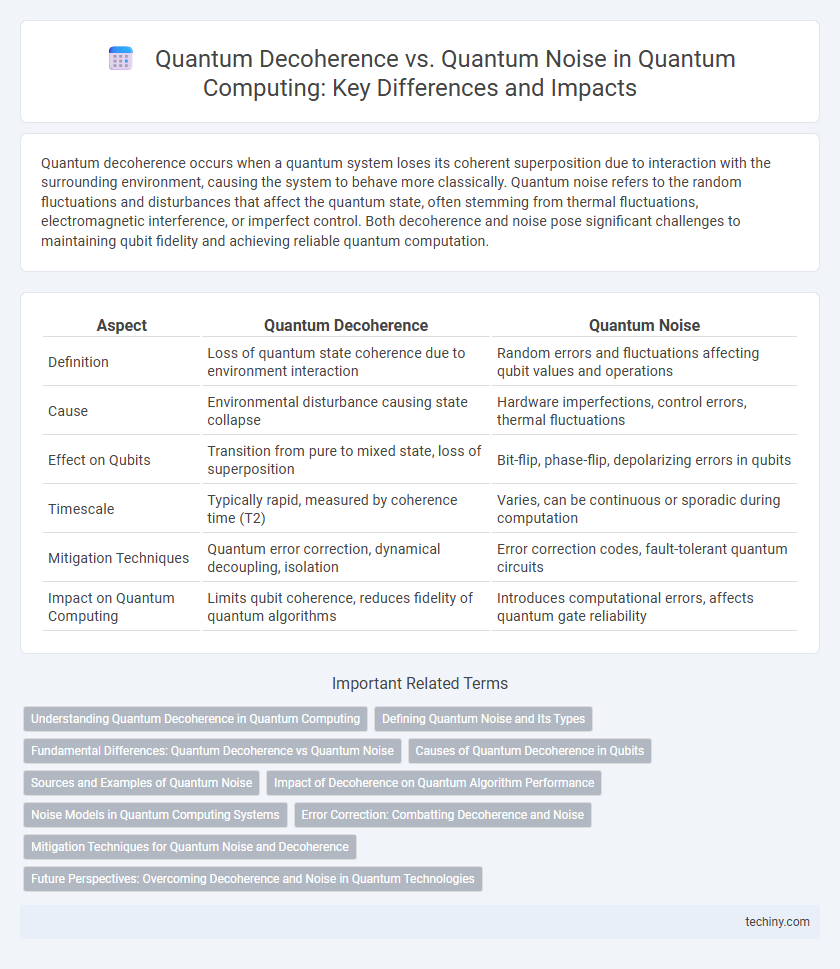Quantum decoherence occurs when a quantum system loses its coherent superposition due to interaction with the surrounding environment, causing the system to behave more classically. Quantum noise refers to the random fluctuations and disturbances that affect the quantum state, often stemming from thermal fluctuations, electromagnetic interference, or imperfect control. Both decoherence and noise pose significant challenges to maintaining qubit fidelity and achieving reliable quantum computation.
Table of Comparison
| Aspect | Quantum Decoherence | Quantum Noise |
|---|---|---|
| Definition | Loss of quantum state coherence due to environment interaction | Random errors and fluctuations affecting qubit values and operations |
| Cause | Environmental disturbance causing state collapse | Hardware imperfections, control errors, thermal fluctuations |
| Effect on Qubits | Transition from pure to mixed state, loss of superposition | Bit-flip, phase-flip, depolarizing errors in qubits |
| Timescale | Typically rapid, measured by coherence time (T2) | Varies, can be continuous or sporadic during computation |
| Mitigation Techniques | Quantum error correction, dynamical decoupling, isolation | Error correction codes, fault-tolerant quantum circuits |
| Impact on Quantum Computing | Limits qubit coherence, reduces fidelity of quantum algorithms | Introduces computational errors, affects quantum gate reliability |
Understanding Quantum Decoherence in Quantum Computing
Quantum decoherence in quantum computing refers to the loss of quantum coherence caused by the interaction of a quantum system with its environment, leading to the collapse of the quantum superposition into classical states. This phenomenon is a major obstacle in maintaining qubits' delicate quantum states, as it degrades the fidelity of quantum information and causes errors in quantum computations. Quantum noise, while related, encompasses random fluctuations affecting qubit performance, but decoherence specifically describes the irreversible loss of phase information crucial for quantum algorithms.
Defining Quantum Noise and Its Types
Quantum noise refers to the random fluctuations and disturbances that affect quantum systems, causing errors in quantum computations and information processing. Common types of quantum noise include amplitude damping, phase damping, and depolarizing noise, each impacting qubit states differently by altering their probabilities or coherence. Understanding these noise mechanisms is essential for improving error correction techniques and enhancing the stability of quantum computers.
Fundamental Differences: Quantum Decoherence vs Quantum Noise
Quantum decoherence refers to the loss of quantum coherence caused by a system's interaction with its environment, leading to the transition from a pure quantum state to a classical probabilistic state. Quantum noise, on the other hand, represents random fluctuations and errors inherent in the quantum system itself or introduced by external disturbances during quantum operations. The fundamental difference lies in decoherence being an environmental-induced process degrading quantum information, whereas quantum noise encompasses intrinsic and extrinsic stochastic errors affecting quantum computation fidelity.
Causes of Quantum Decoherence in Qubits
Quantum decoherence in qubits primarily arises from unwanted interactions between the quantum system and its surrounding environment, leading to the loss of quantum coherence. Key causes include coupling with electromagnetic fields, thermal fluctuations, and defects in the qubit material that introduce phase errors. These environmental disturbances degrade the superposition states, limiting the reliability and longevity of quantum information processing.
Sources and Examples of Quantum Noise
Quantum noise arises from various sources such as thermal fluctuations, electromagnetic interference, and imperfections in quantum gates, causing errors in qubit states. Common examples include phase damping, amplitude damping, and depolarizing noise, which degrade coherence and reduce computational accuracy. Understanding these sources is essential for developing error correction protocols and improving quantum system stability.
Impact of Decoherence on Quantum Algorithm Performance
Quantum decoherence critically undermines quantum algorithm performance by causing loss of quantum information through interactions with the environment, leading to errors in qubit states. Unlike quantum noise, which refers to random fluctuations affecting qubits, decoherence results in the collapse of superposition and entanglement, fundamentally reducing algorithmic accuracy and reliability. Mitigating decoherence is essential for maintaining coherence times that enable complex quantum computations and error correction protocols.
Noise Models in Quantum Computing Systems
Quantum decoherence and quantum noise are critical challenges in maintaining qubit integrity within quantum computing systems, where noise models such as depolarizing, amplitude damping, and phase damping characterize errors impacting computational fidelity. These noise models simulate environmental interactions causing qubit state disturbances and information loss, directly influencing error rates and gate operation reliability in quantum processors. Accurate modeling of quantum noise enables the development of effective quantum error correction codes and noise mitigation strategies essential for scalable and fault-tolerant quantum computing architectures.
Error Correction: Combatting Decoherence and Noise
Quantum decoherence and quantum noise both cause errors in qubits, disrupting quantum computations by degrading their fragile quantum states. Quantum error correction codes, such as the surface code and Shor's code, are designed to detect and correct these errors by encoding logical qubits into multiple physical qubits. Effective error correction protocols mitigate decoherence and operational noise, ensuring greater stability and reliability in quantum processors.
Mitigation Techniques for Quantum Noise and Decoherence
Quantum noise and quantum decoherence present major challenges in maintaining qubit fidelity, with decoherence arising from environmental interactions that collapse quantum states and noise stemming from imperfections in quantum gates and measurement processes. Mitigation techniques involve implementing error correction codes such as surface codes and using dynamical decoupling sequences to preserve coherence by counteracting environmental disturbances. Advancements in qubit isolation, improved materials, and real-time error detection algorithms further enhance the suppression of both quantum noise and decoherence, significantly extending the operational time of quantum processors.
Future Perspectives: Overcoming Decoherence and Noise in Quantum Technologies
Quantum decoherence and quantum noise pose significant challenges in the advancement of quantum computing by disrupting qubit coherence and causing computational errors. Future perspectives emphasize the development of error-correcting codes, noise-resilient qubit designs, and advanced quantum control techniques to enhance system stability and scalability. Emerging materials and cryogenic environments are also critical in mitigating decoherence and noise, enabling more reliable and fault-tolerant quantum technologies.
Quantum Decoherence vs Quantum Noise Infographic

 techiny.com
techiny.com